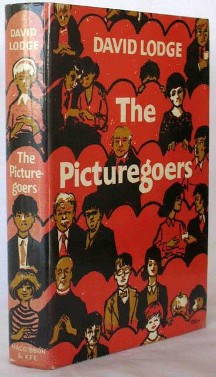Source: Algernon Blackwood, The Promise of Air (New York: E.P. Dutton, 1918), pp. 170-173
Text: The rush of the wonderful cinema then began, and he forgot himself.
They experienced the sense such a performance leaves behind of having been—as Mother put it—all over the place. Sitting in the dark the individual at first is conscious only of himself, neighbours ignored if not forgotten. The screen then flashes into light, and with the picture, consciousness flashes across the world. The lie of the stationary photograph is corrected, time is denied, partially at least, and space is unable to boast and swagger as it loves to do. The cinema frees and extends the consciousness, restores the past, and sets distance close beneath the eyes. Only the watching self remains—pregnant symbol!—in the darkness.
It was one of the best performances in London; within an hour or two the audience danced from the dingy streets of the metropolis into the sunlight of India, Africa, and of islands among far southern seas. The kaleidoscope of other lands and other ways of thinking, acting, living carried them away with understanding sympathy. From savage wild life drinking at water-holes in the sun-drenched Tropics, they darted across half-charted oceans and watched the penguin and the polar bear amid arctic ice. Over mountains, down craters, flying above cities and peering deep under water, the various experiences of strange distant life came into their ken. They flew about the planet. The leaders of the world gazed at them, so close and real that their emotions were legible on their magnified features. They smiled or frowned, then flashed away, and yet still were there, living, thinking, willing this and that. Widely separated portions of the vast human family presented themselves vigorously, registered a tie of kinship, and were gone again about their business, now become in some sense the business of the audience too. Fighting, toiling, loving, hating, meeting death and adventure by sea and land, creating and destroying, differing much in colour, custom, clothing, and the rest, yet human as Wimble and his family were human, possessed with the same griefs, hopes, and joys, the same passion to live, the same fear of death—one great family.
Joan slipped her arm into that of her father; they nestled closely, very much in sympathy as the world rushed past their eyes upon the screen. “We’re flying,” she whispered, with a squeeze, as the penguins on the polar ice gave place to a scene of negroes sweating in the sun and munching sugar-cane while they lazily picked the fluffy cotton. “We’re everywhere all-at-once, don’t you see?” A moment later, as though to point her words, they looked down upon a mapped-out country from an aeroplane. The unimportance of earth was visible in the distance.
“You can’t fly under water anyhow,” mumbled Wimble, as they left the air and flashed with a submarine upon sponges, coral, and inquisitive, perfectly poised fish. A black man was trying to knife a shark.
“I can see what they feel though,” was the whispered answer. “Inside their watery minds, I mean.”
“Wherever I am I go,” he thought, but didn’t say it, because by the time he had reflected how foolish it was to remain stuck only upon the minute point of his own tiny personal experience, they were climbing with a scientific Italian of eminence down a crater full of smoke and steam, and could almost hear the thunder of the explosions. But while they went down, everything else went up. Smoke, steam, masses of rock all trying to rise. “Gravity is the devil,” he remembered; “it keeps us from flying into the sun.”
The idea made him chuckle, and Joan pinched his arm, giggling too audibly in her excitement. “Hush!” said Mother. They watched in silence then; a bird’s-eye view of the planet was what they watched. With each picture they took part. Every corner of the globe, with its different activities, touched their hearts and minds with interest—busy, rushing life in various forms, and all going on simultaneously, at this very moment—now. Life obviously was one. The strange unity was convincing. Nothing they saw was alien to themselves, for they took part in it. In each picture they “wondered what it felt like.” They took for an instant, longer or shorter, the point of view of a new aspect of life, of something as yet they had not actually experienced. They longed—or dreaded—to stand within that huge cavern of blue lonely ice and hear the waves of the Polar Sea lick up the snow; to taste that sugary cane with animal-white teeth, and feel the fluffy cotton between thick, lumpy fingers; to swim under water and look up instead of down; to crawl fearfully a little nearer to the molten centre of the planet through smoke and fire and awful thundering explosions. They longed or dreaded. Mentally, that is, they experienced a new relationship in each separate case, a relationship that stretched a suburban consciousness beyond its normal ken.
Comments: Algernon Blackwood (1869-1951) was a British writer of ghost stories and fantastical fiction. The Promise of Air is one of his novels on a mystical theme, and is concerned with freeing the spirit from the limitations of the human frame. Characters are either earthbound or airy. The above passage is part of a long sequence covering the central Wimble family’s visit to a cinema, in which their rhapsodic experience are occasionally touched by the practicalities of attending a cinema.
Links: Copy at Hathi Trust
